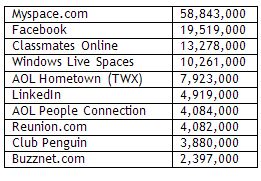Social networkers love numbers; “I have 20,000 friends”, or “My profile has just had its millionth view”, for instance. But actually, who cares? Other than massaging the ego of the individual social networker, numbers do not matter much.
 Take for instance the latest figures on social networking viewers (shown right). The table shows the number of visitors in October. Wow! MySpace must be happy with nearly 59 million people. True, for a web site whose income depends upon advertising that’s essential – after all, Internet adverts are amongst those with the least engagement, compared with, say, print advertising. So you need a massive audience to be able to make any money from adverts online.
Take for instance the latest figures on social networking viewers (shown right). The table shows the number of visitors in October. Wow! MySpace must be happy with nearly 59 million people. True, for a web site whose income depends upon advertising that’s essential – after all, Internet adverts are amongst those with the least engagement, compared with, say, print advertising. So you need a massive audience to be able to make any money from adverts online.
But what about the readers of MySpace pages? Do they care about the huge numbers? Almost certainly not. The average number of friends is pretty low; even “Tom” who everyone who signs up with MySpace gets as a friend only has around 2 million of them – much, much lower than the social network site’s actual usage. In other words, MySpace gets many, many more visitors than actual users.
What do the real users do? They form groups. The same is true on Facebook – and now on LinkedIn. People are getting together in much smaller social networking groups that mean something to them. The big numbers don’t matter – except to the site owners.
Take Ecademy as an example. According to its Alexa rankings it has about 200,000 visitors per month, making it an absolute tiddler in comparison with Facebook or MySpace. Indeed, Ecademy is soon to celebrate 10 years online and has yet to muster even half a million users, whereas Facebook is less than two years old and already has neraly 20 million. So, by these measures Ecademy has done something wrong. But has it?
Ecademy has remained focused on social networking amongst UK-based micro businesses. Most of its users are sole traders and even though it has international groups, they are but a fraction of its membership. It is the focus on British small business that has helped Ecademy’s success. The danger for the owners is that they will seek to emulate Facebook and the like, chasing the big numbers and that will spell the beginning of the end.
Numbers do not really matter very much. True you need enough people in a social network to get the conversations going. But providing everyone is focused on what the network is about, you will get engagement. If a social network aims for the big numbers – which it must do if it’s income model is based on advertising – then it will fragment into groups, just like MySpace and Facebook.
And the same is true for your company’s web site; if you chase numbers, rather than engagement, you are facing in the wrong direction.
